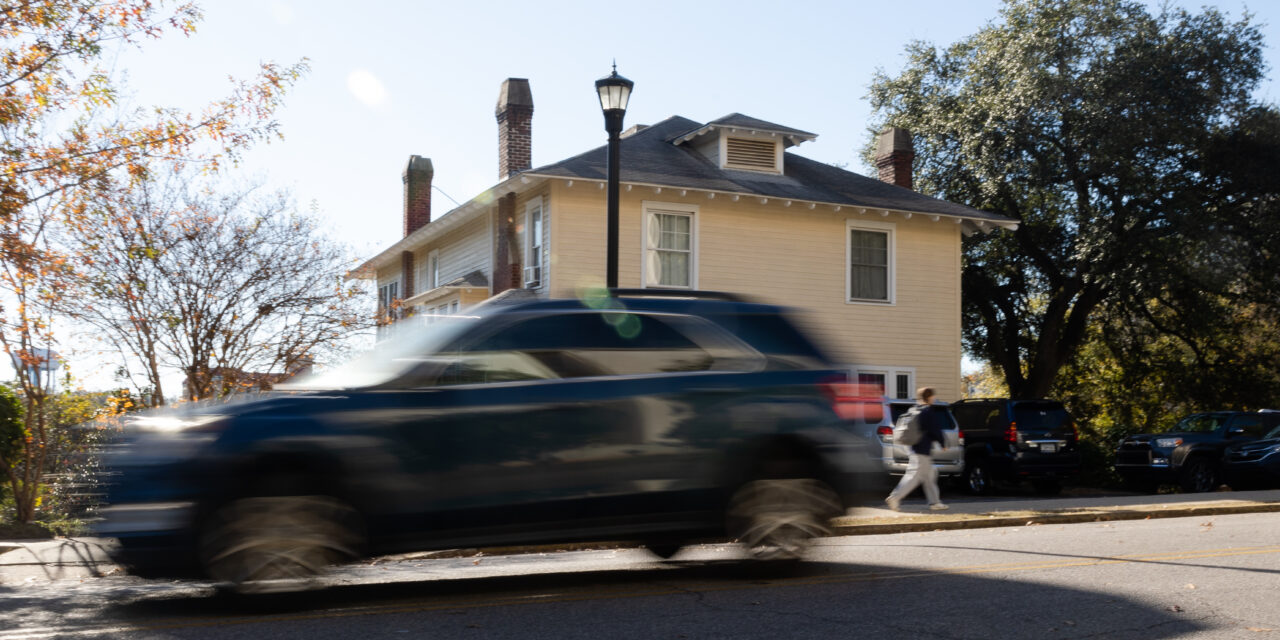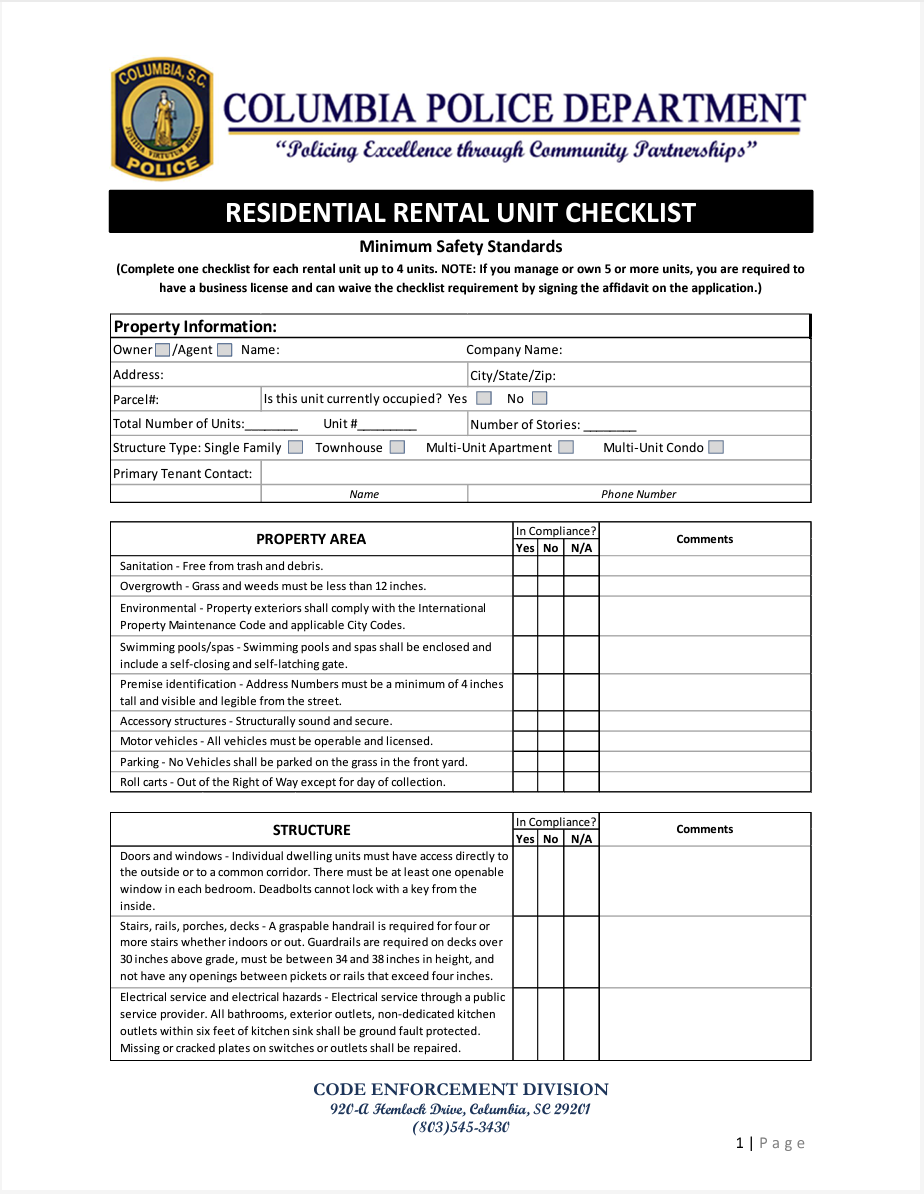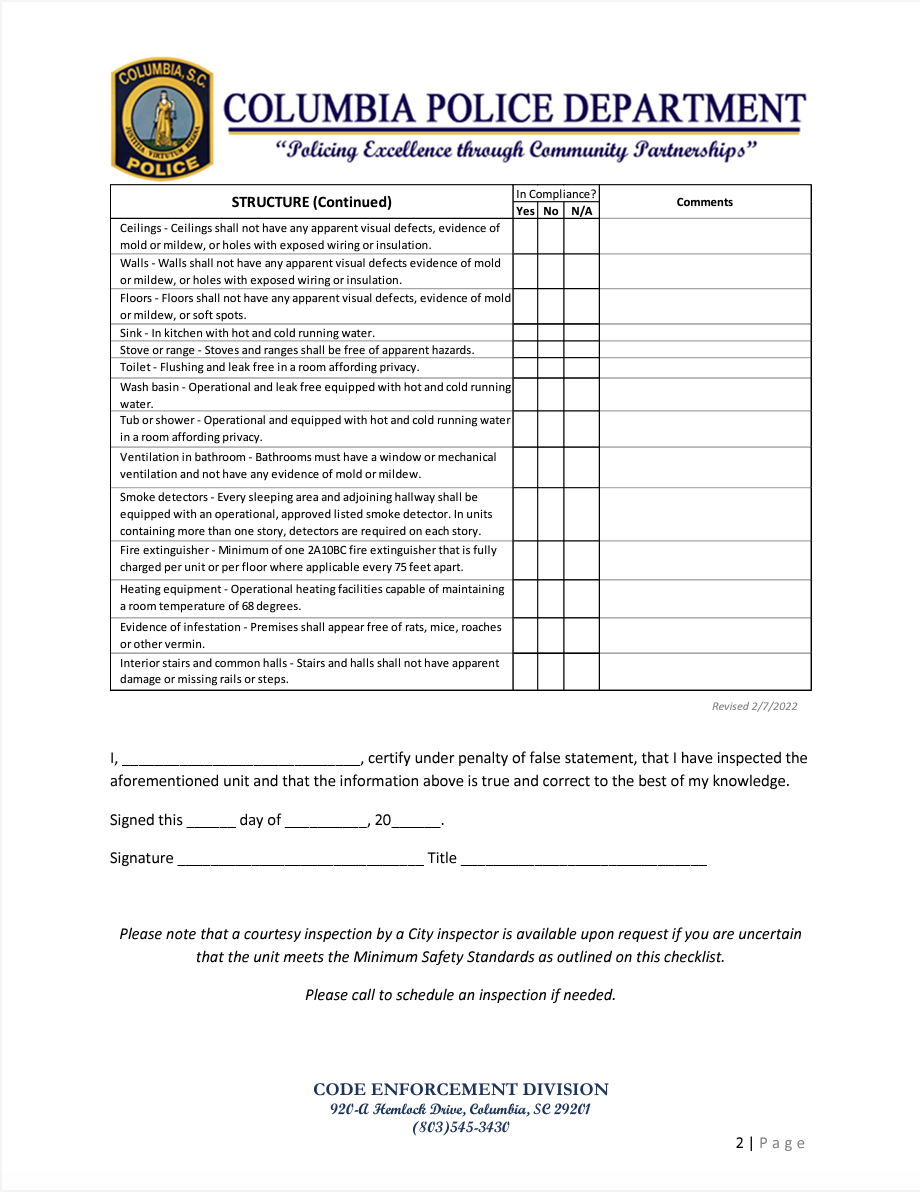A car and a student pass a house near USC. (Photo by Sydney Dunlap/Carolina News & Reporter)
As USC’s student enrollment has continued to climb dramatically, Columbia officials are working to maintain the city’s family-friendly neighborhoods while facing an influx of students living off campus.
New regulations on rental housing have led to legal questions, confusion and disagreements over whether student tenants are given too much or too little leeway. And some housing ordinances are enforced more loosely than others. The rules are increasingly under scrutiny as students take over a larger amount of the city’s affordable housing, moving into all but the most-expensive one or two neighborhoods and upsetting residents across downtown.
In what’s arguably the biggest move, Columbia created a points system in which landlords with housing ordinance violations can be fined and even prohibited from leasing if their tenants continue to break the rules.
Among the most controversial ordinances is one that prohibits landlords from renting to more than three unrelated tenants under one roof. It’s an ordinance that has survived a court challenge by a prominent property manager who is now governor.
But the ordinance is not always enforced, according to several USC students, including ones who’ve lived in homes with more than three roommates.
Enrollment at the University of South Carolina is at an all-time high, with a record 7,344 freshmen starting in 2023, pushing the total undergraduate enrollment to more than 36,300. But only 10,113 students were projected to live on campus, leaving more students to rely on off-campus housing in neighborhoods surrounding the urban school.
Undergraduate student enrollment has grown by about 4,000 students on USC’s Columbia campus over the past decade.
Three-tenant limit is the rule – not the reality
Freshman real estate major Abigail Weathers is one of many students looking for a house near USC.
But she hasn’t considered the city ordinance and plans to live with four unrelated friends in a four-bedroom house.
“My real estate agent hadn’t said anything,” Weathers said. “So, I’m not really, like, too concerned about it because I don’t think, I feel like my real estate agent would have told me if I couldn’t.”
Weathers is like many students who are unbothered by the city ordinance limiting homes to three people.
Families are exempt from the three-person limit for a single-unit home. The ordinance defines a family as two or more people related by blood, marriage, adoption or guardianship or a group of no more than three unrelated people.
Several other student renters told the Carolina News & Reporter they’re also living in homes with more than three unrelated people. One house had nine people at one point.
Some said their landlords separate residents into two leases despite operating the house as a single home. Others overtly live in a single home under a single address with four or more roommates.
Junior advertising student Grace Orr said she lives in a four-bedroom apartment, within walking distance from USC’s campus, with three other roommates all under one lease.
“We’ve had a great experience here,” Orr said. “The location is perfect. And living in a house is obviously really nice compared to apartment living.”
Houses offer more space, with a backyard for a pet. They also often are quieter and more private than typical student apartment complexes. And, with multiple roommates, the rent is lower for each person, which makes the option appealing to students.
If a house is found to be in violation of the housing ordinance, the city could send the owner a zoning violation notice that requires the occupancy to be reduced within 30 days.
But many violations never get to that point. Rental houses are not required to be inspected regularly in person, meaning most violations must be reported to be discovered.
Shrinking historic neighborhoods
Kit Smith is a community activist and former Richland County Council member who lives in a neighborhood just a few blocks from USC’s main campus.
She loves her home — its location, the family-focused neighborhood and the structure’s long history. But as college students continue to move off campus, Smith said she thinks many neighborhoods like hers are at risk.
“Olympia is gone,” Smith said of the residential area with a high mix of rental homes where two large old mills have been renovated into commercial complexes that target USC students.
“It used to be a vibrant, mill-committed community with lots of second-, third- and fourth-generation families, and it has been overwhelmed by students,” Smith said.
Columbia City Councilman Howard Duvall said the housing situation soon will become dire for working-class families as many houses in Richland County are taken up by students or the growing short-term rental market.
“You take 2,000 houses out of the available rental market in Richland County and that becomes a crisis,” Duvall said. “We are in that crisis now, and we’re working to get out of it by encouraging more single-home construction and providing housing for the citizens that live and work here.”
As many students and landlords have found ways to get around the rules, some students think it’s time to update the ordinance to be more effective.
Senior business major Zach List said officials could check houses for disturbances to reduce problems and that students should be an exception to the three-person ordinance.
“I don’t think that should be a rule, especially in a college town,” List said. “There should be a way around it, because everyone’s trying to save money and live together.”
Junior business major Riley Curran said the ordinance is ineffective. He said the city’s issues should instead be addressed more directly with reserved parking in neighborhoods, for example.
“I think it’s kind of silly,” Curran said of the three-person rule. “At this point, it seems kind of outdated.”
Henry McMaster, who with his wife owns many student rentals in University Hill, attempted to challenge the constitutionality of the ordinance in 2011. McMaster is South Carolina’s governor and has previously been the attorney general and lieutenant governor.
Four unrelated college students lived at a McMaster property that was found to be in violation of the ordinance. He argued in the S.C. Supreme Court case that the ordinance’s definition of “family” was arbitrary.
McMaster said the roommates shared meals and expenses and operated as a single household. But the court ruled against him.
The ordinance was meant to protect and improve the quality of the city, and the ordinance helped achieve that goal, the court said.
The court found the city was justified in limiting unrelated residents to three or fewer specifically because Columbia is a college community. The court found the city had “legitimate governmental interests of controlling the undesirable qualities associated with ‘mass student congestion.’”
Most occupancy violations are discovered through complaints and are then investigated by the city’s zoning department, said Richard Blackmon Jr., the the chief code enforcement officer for the Columbia Police Department.
Columbia uses point system to hold landlords accountable
Duvall said newer regulations are designed to hold landlords accountable for bad behavior in neighborhoods — whether by students or not.
An ordinance passed in 2016 requires a residential rental permit for every long-term rental property in the city. A 2022 update now puts that permit at risk for landlords whose properties have multiple code violations.
Landlords are docked a point against their permits for housing violations, such as long grass or mold in homes. Subsequent violations within a year are punished with five points, or even 10 for serious offenses.
Each point carries a fine of $100. The city can revoke rental permits of property owners with 20 or more points.
Property owners, or a representative, must also live within 45 miles of Columbia.
“There’s someone that we can hold responsible that we can actually get some finality and get the code violations corrected,” Blackmon said, noting it was more challenging before the ordinance change. “It was just some nameless corporation, and there was not a lot we could do.”
Limited enforcement
As with occupancy violations, the code enforcement department often relies on reports to enforce other violations.
Blackmon said property owners must submit a checklist and sign an affidavit confirming that every part of the rental property is up to code.
But Blackmon said the police department’s 23 code enforcement officers drive around their assigned territories regularly to spot and address any violations.
Blackmon said the code enforcement department has partnered with neighborhoods and USC this semester to start an ambassador program. Officers drive around on Thursday, Friday and Saturday nights from 10 p.m. to 2 a.m., addressing potential concerns such as loud music, trash cans being left out and parking issues.
Blackmon said the goal is not to issue violations or fines, but to work with residents to prevent problems in the future.
Smith said that puts the burden on neighbors, which can sometimes be a problem. Her friend’s car was keyed after reporting a violation, Smith said.
Smith said she fears Columbia is becoming less attractive to families as homes that once housed families are being taken over by students.
Jon Sears, who owns seven businesses in Columbia and lives in the Shandon neighborhood, said having a house near USC comes with students.
“There’s people that complain about everything,” Sears said. “So, yeah, I’ve never had a negative experience with students in my neighborhood in Shandon.”
“It’s a half-mile from USC,” Sears said, adding that he could have moved to a different area if he didn’t want to be near student renters.
The problem isn’t going away.
The university doesn’t foresee enrollment dropping anytime soon.
A recent report from the university’s Office of Student Affairs states: “Student interest in the University remains strong and demand for enrollment continues to grow.”
The first page of the Columbia Police Department’s residential rental unit checklist. Landlords must complete the checklist before renting out a unit. (Document courtesy of the Columbia Police Department/Carolina News & Reporter)
The second page of the Columbia Police Department’s residential rental unit checklist. (Document courtesy of the Columbia Police Department/Carolina News & Reporter)
ABOUT THE JOURNALISTS

Jack Wolfe
Wolfe is a junior journalism student at the University of South Carolina. He’s interested in quality-of-life stories affecting Columbia residents. He’s a staff writer for The Daily Gamecock and a newsletter editor for USC’s Sigma Chi chapter. After a summer internship in social media management, he hopes to deepen his understanding of website development technology.

Sydney Dunlap
Dunlap is a junior Honors College student at the University of South Carolina. She is editor-in-chief of the student newspaper, The Daily Gamecock and has won local and national awards for writing and photography. She worked this summer at The State newspaper on everything from historically Black schools to S.C. peach crop woes.




